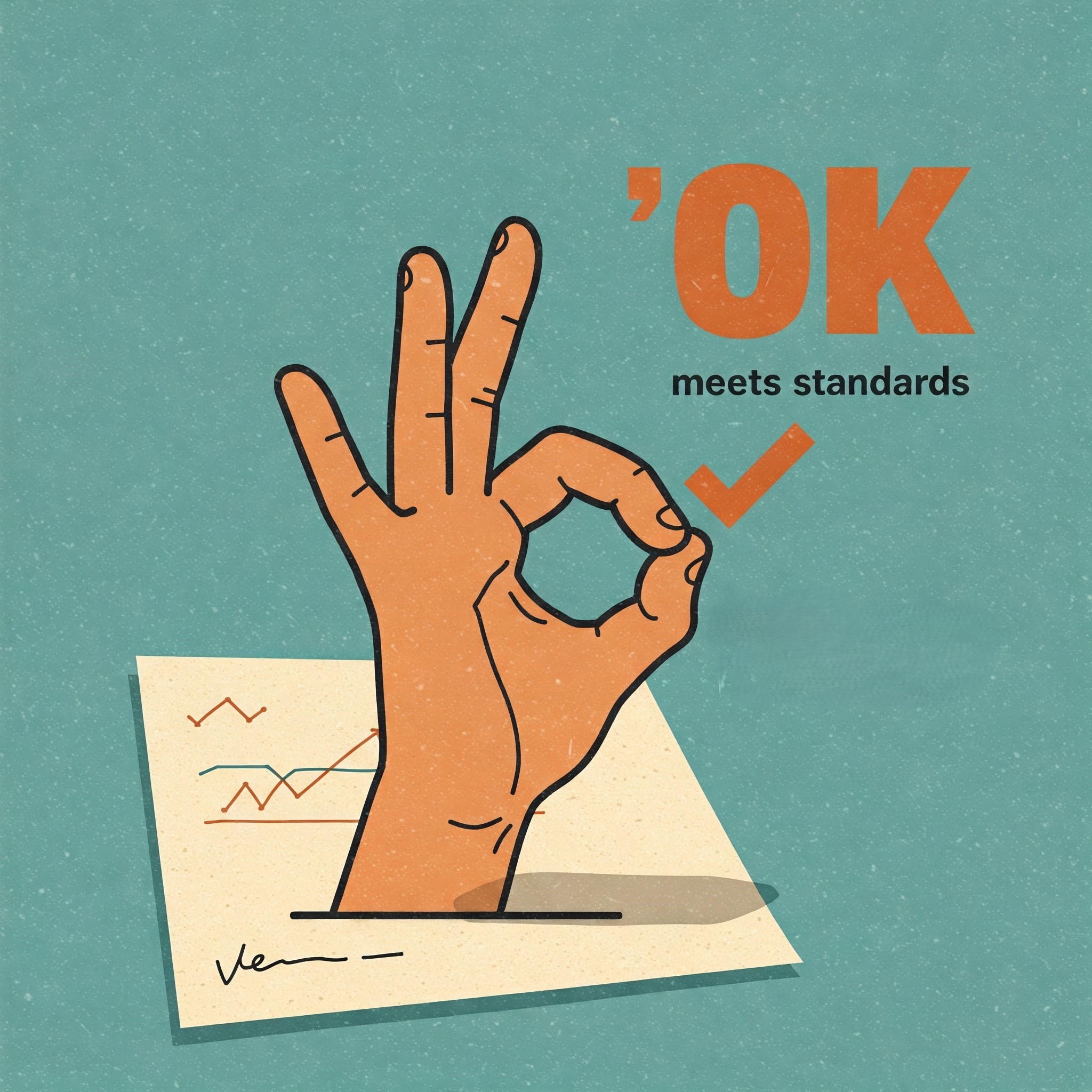OK
Definition
The term "OK" is a versatile word used to indicate agreement, approval, or acknowledgment. It can function as an adjective, adverb, noun, or interjection, depending on the context.
Parts of Speech
- Adjective
- Adverb
- Noun
- Interjection
Pronunciation
American English
- IPA Pronunciation: /oʊˈkeɪ/
- Respelling: OH-kay
British English
- IPA Pronunciation: /əʊˈkeɪ/
- Respelling: OH-kay
Etymology
The origin of "OK" is widely debated, but the most accepted theory traces it to the 19th-century abbreviation of "oll korrect," a humorous misspelling of "all correct" in Boston newspapers. The term gained popularity during Martin Van Buren's presidential campaign in 1840, where it was associated with his nickname, "Old Kinderhook."
Derivatives
- Okay (alternative spelling)
- Okey-dokey (informal)
- OKed (verb, past tense)
- OKing (verb, present participle)
- OKness (noun, informal)
Synonyms
- Fine
- Alright
- Satisfactory
Antonyms
- Poor
- Bad
- Unsatisfactory
Usage
The term "OK" is one of the most commonly used words in the English language. It can confirm understanding ("OK, I got it"), express agreement ("That plan sounds OK"), or acknowledge information ("OK, let's proceed").
Related Terms
- Approval: The action of agreeing to something.
- Acknowledgment: Recognition of something's existence or truth.
- Agreement: Harmony in opinion or action.
Detailed Definitions
Adjective
- Satisfactory or acceptable: Indicates that something is adequate or meets basic standards.
- Example: "The results were OK, but not outstanding."
Adverb
- In a satisfactory manner: Refers to doing something in an adequate or acceptable way.
- Example: "She managed the task OK despite the challenges."
Noun
- Approval or agreement: Denotes formal consent or acceptance.
- Example: "We need the manager’s OK to proceed."
Interjection
- Used to express agreement or acknowledgment: Often a standalone statement confirming understanding or consent.
- Example: "OK, I’ll see you tomorrow."
ok



🇨🇳 Mandarin
- 好的 (Hǎo de) - OK, good
- IPA: /xǎu dɤ/
- English respelling: haow de
- 行 (Xíng) - OK, alright
- IPA: /ɕíŋ/
- English respelling: shing
🇮🇳 Hindi
- ठीक है (Thik hai) - OK, alright
- IPA: /ʈʰiːk ɦɛː/
- English respelling: theek hai
- हाँ (Haan) - Yes, OK
- IPA: /ɦɑːn/
- English respelling: haan
🇪🇸 Spanish
- Vale - OK
- IPA: /ˈbale/
- English respelling: bah-le
- Está bien - OK, alright
- IPA: /esˈta βjen/
- English respelling: es-ta byen
🇫🇷 French
- D'accord - OK
- IPA: /d‿a.kɔʁ/
- English respelling: da-kor
- Ça va - OK, alright
- IPA: /sa va/
- English respelling: sa va
🇸🇦 Modern Standard Arabic
- حسنًا (Hasanan) - OK
- IPA: /ħasaːnan/
- English respelling: ha-sa-nan
- موافق (Mawafiq) - OK, agree
- IPA: /mawaːfiq/
- English respelling: ma-wa-feeq
🇧🇩 Bengali
- ঠিক আছে (Ṭhik āchē) - OK, alright
- IPA: /ʈʰik ace/
- English respelling: thik a-che
- হ্যাঁ (Hyā̐) - Yes, OK
- IPA: /ɦjaŋ/
- English respelling: hyang
🇷🇺 Russian
- Хорошо (Horosho) - OK, good
- IPA: /xərɐˈʂo/
- English respelling: kho-ro-sho
- Ладно (Ladno) - OK, alright
- IPA: /ˈladnə/
- English respelling: lad-na
🇵🇹 Portuguese
- Tudo bem - OK, alright
- IPA: /ˈtudu ˈbẽj̃/
- English respelling: too-doo ben
- Certo - OK, right
- IPA: /ˈsɛʁtu/
- English respelling: ser-too
🇮🇩 Indonesian
- Baik - OK, good
- IPA: /baik/
- English respelling: ba-ik
- Oke - OK
- IPA: /o.ke/
- English respelling: o-ke
🇩🇪 German
- In Ordnung - OK, alright
- IPA: /ɪn ˈɔʁdnʊŋ/
- English respelling: in ord-noong
- Gut - OK, good
- IPA: /ɡuːt/
- English respelling: goot
🇯🇵 Japanese
- 大丈夫 (Daijōbu) - OK, alright
- IPA: /dai̯d͡ʑoːbu͍/
- English respelling: dai-jo-bu
- 了解 (Ryōkai) - OK, understood
- IPA: /ɾjoːkai̯/
- English respelling: ryo-kai
🇻🇳 Vietnamese
- Được - OK
- IPA: /ɗɨək˧ˀ˨ʔ/
- English respelling: duoc
- Tốt - OK, good
- IPA: /tɔːt˧ˀ˨ʔ/
- English respelling: tot
🇰🇷 Korean
- 괜찮아 (Gwaenchanha) - OK, alright
- IPA: /kwɛn.tɕʰa.na/
- English respelling: gwen-chan-ha
- 알겠어 (Algess-eo) - OK, understood
- IPA: /al.ɡɛ.s͈ʌ/
- English respelling: al-gess-eo
🇹🇷 Turkish
- Tamam - OK
- IPA: /taˈmam/
- English respelling: ta-mam
- İyi - OK, good
- IPA: /ij/
- English respelling: ee-yi
🇵🇰 Urdu
- ٹھیک ہے (Theek hai) - OK, alright
- IPA: /ʈʰiːk ɦɛː/
- English respelling: theek hai
- ہاں (Haan) - Yes, OK
- IPA: /ɦaːn/
- English respelling: haan





